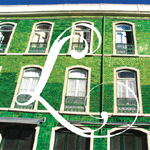 Nearly four years after crafting Playthroughs Keith Fullerton Whitman is finally returning to the sound that practically defined his place among the masters of experimental music. Working again with processed guitar, Whitman has modified the setup used to write Playthroughs and come away sounding fresh and exciting once more. This time around the music is more prodigious and towering than ever, a wall of incandescent guitars backed by the flicker of digital starlight.
Nearly four years after crafting Playthroughs Keith Fullerton Whitman is finally returning to the sound that practically defined his place among the masters of experimental music. Working again with processed guitar, Whitman has modified the setup used to write Playthroughs and come away sounding fresh and exciting once more. This time around the music is more prodigious and towering than ever, a wall of incandescent guitars backed by the flicker of digital starlight.Kranky
Lisbon was recorded live on stage at the Galeria Zé Dos Bois in October of 2005. Whitman has noted on the Kranky website that his typical attention to detail has been forgone in favor of letting the raw performance speak for itself. Whatever details he felt were in need of editing or re-working are unrecognizable to these ears, however. Lisbon shines with a candor and energy that makes a term like "flaw" seem superfluous, the result of a perspective that fails to acknowledge beauty in unexpected places. As the single, 40+ minute piece opens, Whitman immediately casts away the curtain of silence with a beaming ray of orchestral sheen. The effect isn't unlike hearing an orchestra warm up. After bringing the instruments up to power the embryonic playfulness condenses into a unified tone that washes back and forth, swaying lazily in the air. Whitman practically captures the movement of branches and leaves in a tree, his music the flow of air that forces their subtle, relaxing movements. Sounding like the call of insects, a series of high pitched tones in the background eventually work their way forward in the mix, adding a new dimension to the picture that Whitman slowly builds over the duration of Lisbon. Playthroughs was a majestic album to be sure, but in the first minutes of this composition Whitman paints a picture more vivid than anything else in his catalog. The instant he begins to introduce other electric sources and strange sounds his work flowers to life, cast in the light of a blooming spring-time panorama. Nothing is more attractive to me than an album that can capture such picturesque beauty so effortlessly.
Postcard serenity isn't a facet of Lisbon's sprawling resonance, however. Bright and sunny tones spill out over the record at times, but so does the racket of tempest-like noise. Splashes of static rain and heavy winds blow through the processed guitar nearly halfway through, sometimes overcoming the sunny disposition it expels and sometimes complimenting it. More and more sources are added to the mix, conjuring up the sense that a storm is on the horizon and then Whitman carefully deconstructs everything he's built up to this point. Imperial horns begin calling through the haze of sounds and they slowly fill the entire piece. A sense that there must be some shelter from the storm is immediately invoked by this addition. Before that promise of shelter can be secured, however, everything tunes down, slowly melts away underneath the fulguration of dying tones and dissolves into a revelation of distorted guitars, more recognizable than before. Whitman casts the entire composition into an abyss and picks it back up again to unveil a swirling pool of solos and fuzz-beyond-fuzz effects. The entire second half of Lisbon is a racket of buzzing saws, high pitched scratches, and the rumble of fallen timber. The piece slowly transforms from a droning titan into a stumbling drunk that's somehow found himself lost in a mess of cosmic proportions. Microcosmic sound shivers and splatters on the concrete, breaking reality in half and reconstructing it atom by atom. I always picture the final moments of Carl Sagan's Contact at this point, a flurry of cosmic events rushing by while the transport device is nearly torn to shreds.
Nothing on Lisbonever gets as out of control as that, however. Very few moments on therecord sound like moments of pure chaos; Whitman quickly pulls much ofhis material back together before the piece gets too out of hand. Whilethere does seem to be a bit of random sampling occurring towards theend of the album, Whitman uses it to great effect. Before allowing foranything structured or immediately recognizable as a melody toreappear, Whitman sends much of his material through a blender andallows the contents to spill out over the sides. Slowly, a shimmeringhint of light appears and the sounds of bird calls enters the piece.It's almost as if Whitman's performance was a demonstration of musicaldusk and dawn, a detailing of the process from one to the other. It'simpossible not to hear currents of life in the music, impossible not toaffiliate some of the futuristic tones with alien signs of life. Ipicture this music playing as the black monolith from 2001 appears on the surface of the moon; its a fitting picture because the monolith in that movie was simultaneously familiar and completely unidentifiable. It was a disturbing and attractive symbol that immediately cut its way in my mind, much like this album does. It seems uncommonly earthbound and unfalteringly universal as it pulses and warps its way through to its completion. The arc of this disc is essential to its power, the transformation it undergoes the essential element of its appeal. There are gorgeous momentslittered throughout, but there can be little questioning Whitman'sdecision to make this a single piece. It requires listening to theentire album to feel its force. It's a force of musical nature thatlives and breathes just as much as any life form.
samples:
Read More

